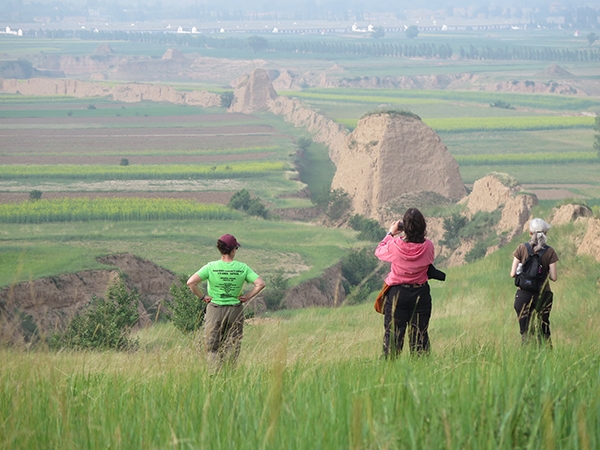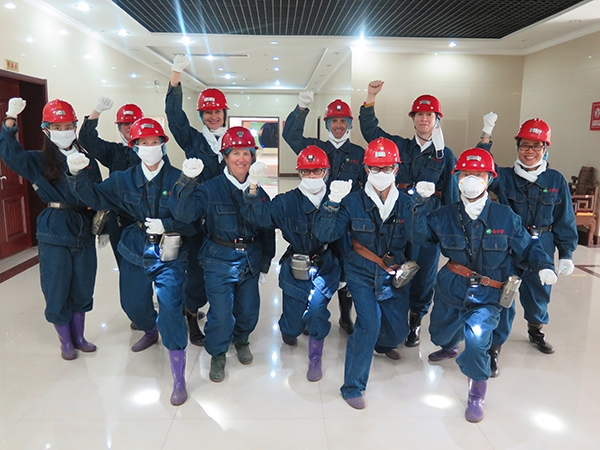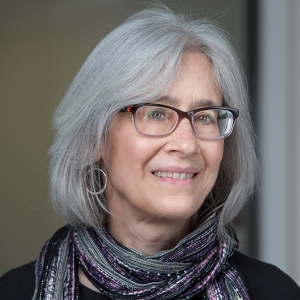China’s rapid development can be studied through a range of disciplines: history, biology, arts, humanities and engineering to name a few.
Last summer a group of 14 faculty from across campus took a 10-day trip to China’s northeast region to see first-hand the effects of rapid industrialization and economic growth. The goal: to develop new interdisciplinary courses and redevelop existing ones.
The trip was supported by a Presidential Leadership Grant from the Andrew W. Mellon Foundation. A second faculty study tour is planned for Berlin in June.
The Presidential Leadership Grant to Stephen C. Ainlay is the second such grant from the Mellon Foundation. The first launched the annual Symposium on Engineering as a Liberal Art. The proposal for the latest grant was inspired by Ainlay’s experience on a faculty travel grant to China when he was at the College of the Holy Cross.
Faculty studied cultural and environmental sustainability and social justice with site visits and workshops that explored the fusion of tradition and modernity around turbo-capitalism, worker migration, coal mining, organic farming and environmental activism. In a post-trip retreat, the faculty developed more than a dozen proposals for Common Curriculum courses or modules focused on sustainability and social justice.
Prof. Joyce Madancy, a historian of China and trip leader, has incorporated readings and discussions about environmental consequences of development into several of her classes. She is also team-teaching a first-year preceptorial, “Made in China,” with Jennifer Bishop, senior lecturer of biology, another participant, that will explore the environmental and socio-political consequences of the Chinese labor market.
“The China study tour brought together faculty dedicated to transforming the Liberal Arts at Union by focusing on the vital questions of social justice and sustainability from a cross-disciplinary, global perspective,” said John Cramsie, associate professor of history and director of General Education. “By focusing on the Common Curriculum, we engage students across the campus in diverse settings and courses, creating opportunities to reimagine General Education around compelling issues of global significance.”
“Union has students whose curiosity transcends disciplines and who are ready to learn from the surprising connections among courses and perspectives that faculty members help them to see,” said Therese McCarty, former vice president for academic affairs and project director for the grant. “Exposing students to more of these surprising connections will give them a deeper, more holistic understanding of questions of great import to humanity.”
Madancy recalled a visit to an organic farm that highlighted the increasing class divide in a country where, for the first time in history, more people live in the city than in the countryside.
The farm was a resource for wealthy families who could “play farmer” on the weekend, she said. “On the other hand, it reflects a mistrust of China’s own agricultural production, which has been plagued by scandals over contamination and tainted food. It’s sort of representative of how distant many people in China’s cities are from that rural backbone that we think of as constituting the essence of traditional Chinese society,” Madancy said.
John Spinelli, professor of electrical and computer engineering, recalled his visit to China in the 1990s, when the country was on the cusp of developing its cities. What he saw on this trip was a depopulating countryside.
“There’s no next generation,” he said of one rural village where the elderly are minding their grandchildren. “It doesn’t seem likely those kids will stay in the village. It’s more likely they will go to the city to join their parents as soon as the parents can financially support them.” Ashok Ramasubramanian, associate professor of mechanical engineering, compared China to his native India, which in the 1980s was ahead economically.
Since then, he noted, the two nations have taken dramatically different trajectories. “We have press freedoms and free elections in India but there are more starving and dying people,” he said.
The trip was chronicled in a 44-minute film by James de Sève, filmmaker-in-residence at Union. The film includes footage of site visits interspersed with faculty commentary. It begins with impressions as the faculty arrive, and ends with their impressions as they leave. De Sève’s film, Ten Days in the Middle Kingdom, can be seen at union.edu/magazine.
Other faculty on the trip were Megan Ferry, associate professor of Chinese and Asian Studies; Kristin Fox, professor of chemistry; Katherine Lynes, associate professor of English; Jennifer Matsue, professor of music; Cherrice Traver, David Falk & Elynor Rudnick-Falk Professor of Computer Engineering; Jenelle Troxelle, assistant professor of English; Anouk Verheyden-Gillikin, lecturer of geology; Jue Wang, assistant professor of mathematics; and Patricia Wareh, associate professor of English. As evidence of China’s profound contrasts, Madancy recalls an early morning atop a fog-enshrouded, worn-down section of the Great Wall in a remote region near Inner Mongolia. “I called my mother to wish her a happy 86th birthday and realized I had four bars on my phone.”



